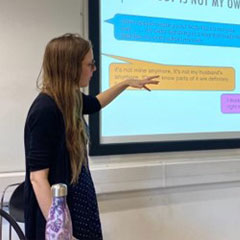Catherine Preston, Senior Lecturer/Associate Professor, Psychology

Catherine completed her PhD at the University of Nottingham before going to the Neuroscience Department at Karolinska Institutet in Stockholm where she was awarded the Wenner Gren and Marie Curie intra-European fellowships.
Since starting at York in 2015 she continues research the role of body representation on mental well-being and teach modules on body representations (Y3) and interoception (Y2).
email: catherine.preston@york.ac.uk
Our 60-second interview with Catherine:
Could you please tell us what work you do in the field of mental health?
I am interested in how bodily experience influences mental health, particularly in relation to the perinatal period (from pregnancy through birth and beyond) and disordered eating behaviours.
What do you find most rewarding and inspiring in this work?
Everyone has a body and our body is important to our sense of self. Since having my own children, I have been particularly fascinated with perinatal body changes. When we go through pregnancy, birth and the postnatal period experiencing dramatic physical changes, it seems intuitive that this may influence how we feel about ourselves. It is also quite an under researched area which needs more focus.
What is the most challenging or complicated aspect of this work?
Working with clinical groups in general means that there are ethical challenges and also communicating with clinicians when they are so busy has its own challenges and rewards. Also, because perinatal bodily experience, in particular, is a very under researched area I had to learn new skills to develop and validate appropriate measures for this group.
What impact do you hope your work is having - or can potentially have?
One of the main areas of impact is introducing the topic of feelings towards the body (including, but not only body appearance) as a safe topic of conversation. Often people feel like this shouldn’t matter and so don’t want to talk about it, but this means they do not get appropriate support. I am also working on potential interventions such as postnatal yoga and using virtual reality technology for disordered eating patients.
Could you share with us one piece of advice that you follow for your own mental health?
Make sure you make time for yourself. Being a full time academic and a mother of two young children I find this hard to do sometimes, but it is so important. We can only really be there for others when we are also looking after ourselves.